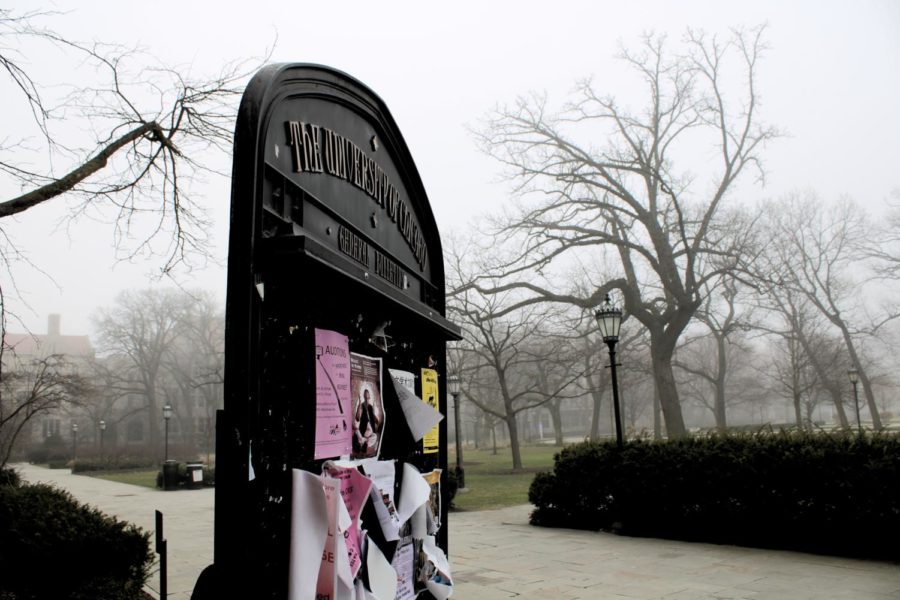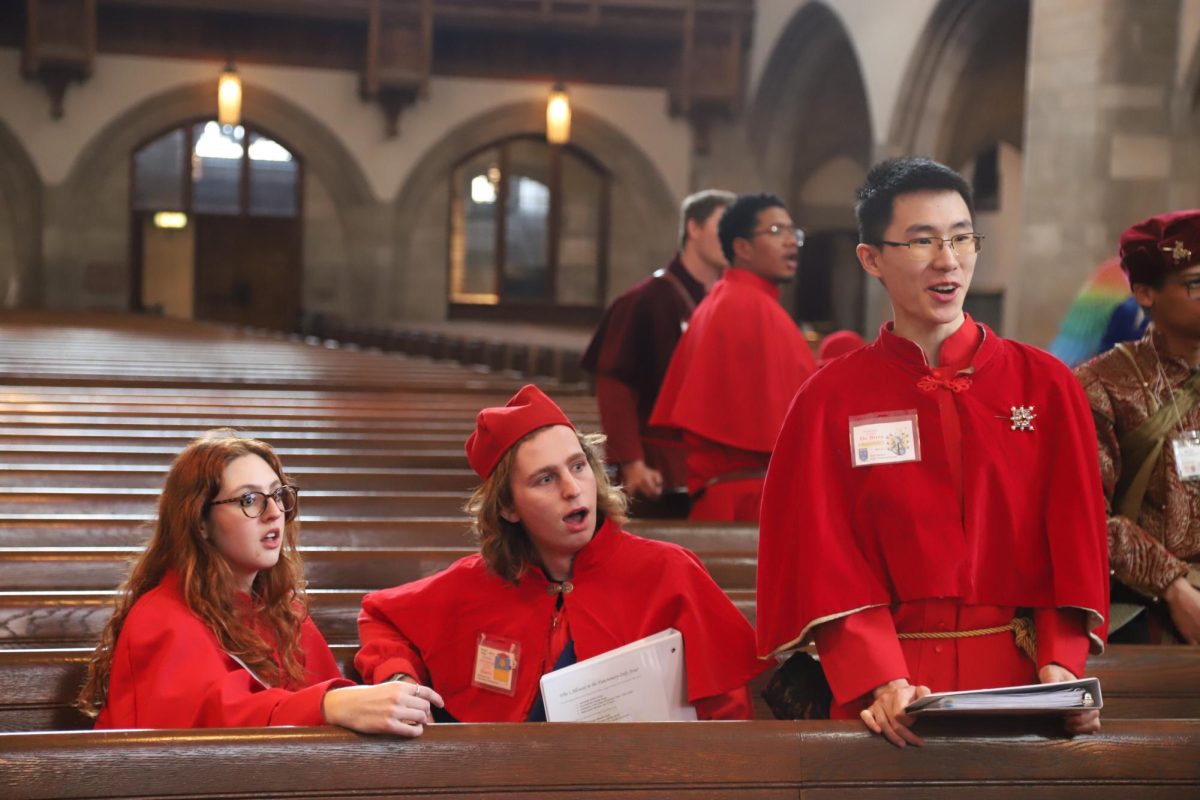[This is the first in a series of articles relating to sexual assault at UChicago.]
“No person in the United States shall, on the basis of sex, be excluded from participation in, be denied the benefits of, or be subjected to discrimination under any education program or activity receiving Federal financial assistance.”
This single sentence, signed into law by former U.S. president Richard Nixon as Title IX of the Education Amendments of 1972, lays the groundwork for universities’ handling of sex-based discrimination.
Complying with this dictate has high stakes for institutions like UChicago, as federal funding—which, the University reported in 2016, accounts for 71 percent of the University’s total sponsored research—is contingent upon their Title IX compliance.
While the essence of Title IX is encapsulated in this excerpt, the policy is extensive, encompassing equal opportunity in the classroom and athletics in addition to matters of sexual misconduct. The Department of Education’s Office of Civil Rights (OCR) puts out specific requirements which outline how the OCR will review complaints filed against universities’ Title IX procedures. These requirements are currently in transition following the change of leadership at the Department of Education (E.D.) with President Donald Trump’s election in 2016.
In this installment, we’ll give a brief overview of the Title IX reporting process at UChicago, the national conversation surrounding the rule, and how it stands to change in light of the E.D.’s change of leadership.
TITLE IX AT UCHICAGO
Reporting Process
Under Title IX, the University is obligated to take immediate action when sexual misconduct is reported. All employees of the University except those designated confidential resources—which includes Student Counseling Service and Student Health Service staff, Sexual Assault Deans-on-Call, and Spiritual Life clergy members—are required to report any Title IX–related incidents they are informed of.
As soon as an incident is reported and determined to allege a violation of University policy, the Title IX Office sends an outreach email to the affected student that explains the complainant’s options, which include the student disciplinary process, confidential resources available, and interim protective or counseling measures.
At this point, students are not obligated to respond to this initial email or to further engage with the Title IX Office. There is no time limit for reporting incidents or initiating a formal disciplinary process; the student may go through with these actions no matter how much time has elapsed since the incident or since it was initially reported.
Many students opt to receive support services rather than initiate the disciplinary process. According to UChicago’s Title IX FAQ website page, reasons why a case might not result in disciplinary action include the complainant’s preference not to move forward with the formal disciplinary process, the case falling outside the University’s jurisdiction, and the student not responding to initial outreach from the Title IX Office.
Disciplinary Action
In order to move forward with the disciplinary process, the student must meet with the associate dean of students and provide a formal written complaint outlining their grievance.
Once this complaint has been submitted, the accused student is notified of the report and is generally given up to five business days to meet with the associate dean of students. Following this meeting, the associate dean gives the accused student access to the complainant's written statement, and the accused student then submits a written response to the allegations.
At this point, the information provided by the complainant and the respondent is reviewed by the associate dean of students. She then has the authority to dismiss the complaint, resolve it administratively with the two parties, or refer it to the University-wide Disciplinary Committee, a body composed of student, faculty, and administrators.
CHANGES TO TITLE IX
Title IX Nationally: “In Limbo”
Secretary of Education Betsy DeVos, appointed by President Trump, initiated changes to federal Title IX policy shortly after she took office in early 2017.
DeVos’s ascent to the position was turbulent. Her focus on alternatives to public schooling sparked nationwide protests, drawing passionate opposition from public school advocates and teachers’ unions and prompting Senate Democrats to hold an all-night session opposing her nomination the night before her confirmation. DeVos was eventually confirmed on a 51–50 vote, making her the first Cabinet member in U.S. history whose nomination was decided by the vice president’s tie breaking vote.
After assuming the position, DeVos became more vocal in her opposition to certain Obama-era guidelines surrounding Title IX, which many Republicans viewed as overreaching into campus life and obstructing due process. DeVos echoes this view in discussions about Title IX, often pointing to the possibility of false accusations of sexual assault.
“This conversation has too often been framed as a contest between men and women or the rights of sexual misconduct survivors and the due process rights of accused students,” DeVos said in a September 2017 speech at George Mason University. “The reality is, however, a different picture. There are men and women, boys and girls who are survivors, and there are men and women, boys and girls who are wrongfully accused.”
In a 2018 60 Minutes interview, DeVos replied “I don’t know” when asked whether the number of false accusations of sexual assaults on campus outnumbers the actual number of sexual assaults. A 2016 Department of Justice report found that one in five undergraduate women are sexually assaulted while in college, and a frequently cited study published by clinical psychologist David Lisak found that around 6 percent of rape allegations made to campus police departments are false.
Under DeVos’s direction, the E.D. is gearing up to pass a formal regulation changing the specific requirements of Title IX. DeVos has yet to release the final regulation, but the OCR’s informal interim guidance reveals a decided break from Obama-era regulations.
The anticipated regulation would carry the force of law, replacing the less formal “Dear Colleague” guidelines put forward under the Obama administration. Many Obama-era precedents are positioned to be overturned in the finalization of the draft rule, reigniting debate over the adjudication of Title IX cases.
Several of DeVos’s proposed changes to Title IX may have a direct bearing on UChicago’s adjudication of cases.
Evidentiary Standards
One of the most salient changes included in DeVos’s draft rule regards evidentiary standards used to adjudicate Title IX cases.
The Title IX guidelines proposed by DeVos allow universities to choose between two legal standards of proof. Where Obama-era guidance mandated the use of the “preponderance of the evidence” standard, which is typically translated into a 51 percent certainty that the allegations are true, the new guidelines allow schools to use a higher standard of proof known as “clear and convincing evidence,” which is generally equated to a 75 percent certainty in the victim’s allegations.
Illinois adopted the “preponderance of the evidence” standard in the Preventing Sexual Violence in Higher Education Act, which UChicago is mandated to follow. UChicago currently operates under the less-strict preponderance standard, and University representatives told The Maroon that, if eventually given the choice between the two, the University would continue to use the preponderance standard, “in accordance with state law.”
In an interview with The Maroon, Isabel Rooper, a communications organizer for survivor advocacy group Know Your IX, said that the preponderance standard is the fairest for use in Title IX proceedings, as it gives equal weight to both parties’ cases.
“Clear and convincing evidence is discriminatory to survivors because it gives greater credence to the [accused party’s] education instead of the survivor’s,” Rooper said. “It puts the greater burden of proof on the survivor.”
The “50 percent plus one” preponderance standard, Rooper said, is “the only standard that's able to give equal credence to both sides’ education and treat them as of equal value.”
Cross-Examination
The Obama-era guidelines strongly discouraged schools from allowing cross-examination of the complainant on the grounds that it may be “traumatic or intimidating” to a possible victim, “thereby possibly escalating or perpetuating a hostile environment.” Alternatively, DeVos’s proposal ensures the right of alleged perpetrators to cross-examine witnesses, including their accuser, in a live hearing.
UChicago currently does not cross-examine complainants. Asked whether it plans to do so in future, University representatives said that UChicago “will continue to comply with Title IX and state law,” and “will review the revised regulations once they are final.”
Defining Key Terms
The definitions of several key terms are also in transition amid DeVos’s new guidelines.
Unlike previous guidance, the proposed regulations do not define what constitutes a “hostile environment” for victims, but they do allow schools to remove an accused person from campus following a safety and risk assessment.
Additionally, DeVos’s guidelines use a narrower definition of sexual harassment. It updates the Obama administration’s definition, “unwelcome conduct of a sexual nature,” to a stricter definition: “unwelcome conduct on the basis of sex that is so severe, pervasive, and objectively offensive that it effectively denies a person equal access to the recipient’s education program or activity.”
In an interview with The Maroon, Fabiana Diaz, a victims’ rights advocate and survivor of sexual assault, called the definition’s qualification that the behavior be “objectively offensive” into question.
“Who is the objective person? Who makes that decision that it’s not considered sexual harassment when you experience that?” Diaz asked. “If someone is hurt, has been harassed, [or] is offended, who is to say that how they’re feeling is not valid?”
UChicago also uses a measure of objectivity in their definition of sexual assault, stating in their harassment policy that “a person’s subjective belief that behavior is intimidating, hostile, or offensive does not make that behavior harassment. The behavior must be objectively unreasonable.”
When asked about the process of qualifying “objectively unreasonable” behavior, University representatives wrote in a statement to The Maroon that “from a disciplinary perspective, the question is whether an individual’s behavior violates policy.”
The University uses an “objectively unreasonable” standard to determine whether behavior qualifies as a policy violation. This is “consistent with applicable law,” representatives wrote.
At UChicago, final disciplinary determinations are made by a University-wide Student Disciplinary Committee. The Committee is composed of students and University staff, who are either nominated or apply to serve, and faculty members, who are appointed by the Provost’s office.
Committee members are randomly selected for each hearing and select faculty members are designated as rotating hearing chairs. They are required to complete training and educational sessions in order to hold the position.
Liability
DeVos’s proposed changes to Title IX also ease universities’ liability for investigating Title IX complaints to a standard of “deliberate indifference.” Where Obama-era guidelines maintained the standard that a school was liable if it “reasonably should know” of an incident, the new guidelines would only hold schools responsible for investigating formal complaints and incidents in which they have “actual knowledge” occurred. Additionally, in determining whether a school adequately addressed allegations, schools would only be found in violation of the law if they were “deliberately indifferent,” or “if its response to the sexual harassment is clearly unreasonable in light of known circumstances.”
Rooper argued that this change, “essentially allows schools to ignore sexual violence and harassment on campus by claiming that they just didn’t know that it was happening.”
Under these liability standards, Rooper explained, to qualify a hostile environment a complainant will not only have to prove that the accused party poses a barrier to their education, but that their education is “effectively denied,” which often requires a student to be on the verge of dropping out of school.
“Raising the standards in this way is going to prevent more survivors from coming forward,” Rooper said. “It’s also going to make it harder for survivors to seek the accommodations that would help them stay in school because this new higher standard is required to receive those.”
Jurisdiction
DeVos’s 2017 interim guidelines only hold universities responsible for incidents that occur “in the context of an educational program or activity operated by the University,” thus excluding off-campus activities such as parties at student apartments or fraternities that are not recognized by the school. This provision was ill-received by many onlookers—even quietly criticized by some Republicans, according to The Washington Post—and the final regulation is expected to offer clarification on this measure.
Diaz criticized this approach, saying that universities should not abdicate responsibility simply because an incident occurred off-campus.
“It is on [the University] to keep students safe and survivors protected. At the end of the day, I don’t care what your lawyers say, these are your students,” Diaz said. “This park might not be owned entirely by your endowment but this is your community that you are also a part of.”
The change in off-campus adjudication could carry consequences for UChicago, which has been steadfast in its decision not to recognize Greek life and to treat fraternity houses as off-campus property.
Currently, UChicago’s jurisdiction is not strictly limited to incidents that occur on-campus. The student manual states that the University’s jurisdiction includes misconduct that happened on or off University property, if: “(a) the conduct occurred in connection with a University or University-sponsored or -recognized program or activity; or (b) the conduct has or reasonably may have the effect of creating a hostile educational or work environment for a member of the University community.”
A Path Toward Improvement
While certain barriers inherent in Title IX may make the reporting process imperfect, Rooper said, she believes that continual advocacy can achieve fairer and safer environments on college campuses.
“There have always been barriers to the reporting process, and there will always be barriers in the reporting process that prevent a survivor from reporting,” she said. “But, at the end of the day, we still have to keep working to make that process fair for both sides and supportive for the students that are going through it.”
“It’s always worth it to try and make that process better.”
[The Maroon is committed to achieving a thorough understanding of this issue. If you or someone you know has experiences or information that you would like to share with us relating to sexual assault and/or the Title IX reporting process at UChicago, please contact us at kmabus@uchicago.edu or lgersony@uchicago.edu.]









